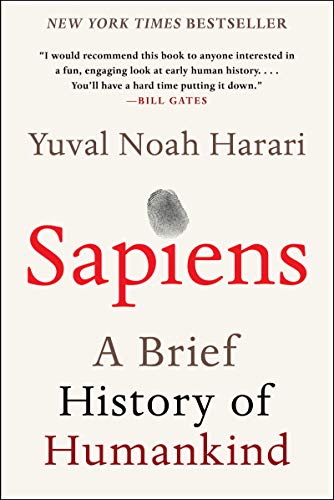The subtitle of the book is A Brief History of Humankind, alerting the reader to the fact that Harari intends to zoom through almost a hundred thousand years of Homo sapiens in just over 400 pages. This is an expansive, impressive, and perhaps foolhardy undertaking, as it must leave out vast swaths of history and development and give short shrift to others. Harari opens the book with "The Cognitive Revolution," a look at how Homo Sapiens came to be and how our species "won out" over the other human species. This section of the book was by far the most engaging bit, surprisingly entertaining and even occasionally humorous. It is also in this beginning chapter that some of Harari's conclusions, presented as fact, could use a close and skeptical reading. This need for questioning gets ever larger as the book goes along through "The Agricultural Revolution" (the worst thing to ever happen to human beings according to Harari), "The Unification of Humankind", and "The Scientific Revolution." Generally Harari sounds convincing but his arguments clearly skew to his own belief system and aren't always well balanced to show other perspectives.
Harari's ideas about human evolution are interesting though and reading this made me reflect back on the History of Life interdepartmental biology/geology class I took in college so many years ago. Interestingly, many of the ideas or seeds of ideas that Harari introduces were not new to me as a result of that class. As the book wore on, I became less and less interested in it and I'm not entirely certain why. Am I too familiar with the later history of us? Had I gotten too irritated by Harari's unprovable assertions? In any case, the book was slow going, especially the closer to the end I got but it was complex and wide ranging in what it covered and it does do a good job introducing people to a lot of ideas about our history (and pre-history) that they might not have considered before. I know others rave about it (Bill Gates and Barak Obama both blurbed it using high praise) and I appreciate that it made me think about things I hadn't thought of in years but despite its certainty, I was left feeling slightly unsettled by some of his arguments and frankly a touch bored in the end.




No comments:
Post a Comment
I have had to disable the anonymous comment option to cut down on the spam and I apologize to those of you for whom this makes commenting a chore. I hope you'll still opt to leave me your thoughts. I love to hear what you think, especially so I know I'm not just whistling into the wind here at my computer.